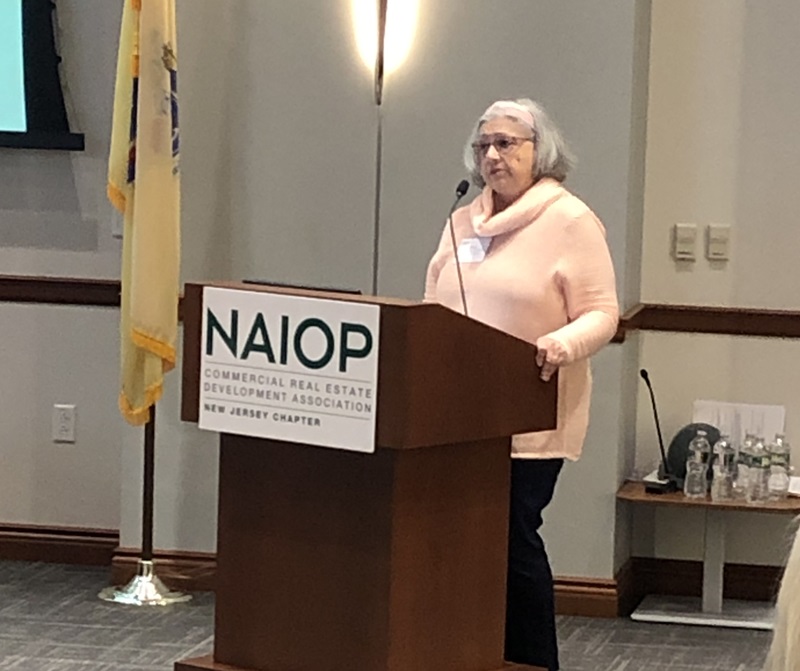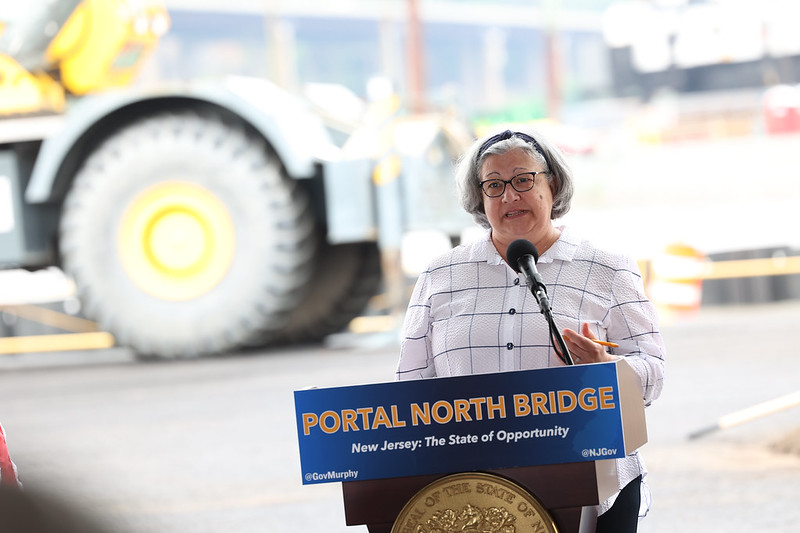Diane Gutierrez-Scaccetti, chief of staff to Gov. Phil Murphy, speaks in August 2022 during an event in Kearny. — Photo by Edwin J. Torres/Courtesy: NJ Governor’s Office
By Joshua Burd
Business groups have lined up against Gov. Phil Murphy’s proposal to charge a fee on warehouses for each truck they receive, but a top state official said the levy is needed to address a chronic lack of traffic planning around new industrial developments.
Diane Gutierrez-Scaccetti, Murphy’s chief of staff, spoke to NAIOP New Jersey members on Tuesday about the hot-button issue that emerged from the governor’s budget proposal late last month, which floated a $1 excise fee for every truck movement, seeking to raise $10 million for the state’s coffers. She noted that the proposal was exactly that — a proposal — but said the idea is meant in part to address “the fact that we are doing a ton of studies on truck rerouting,” as towns with industrial projects look to divert the traffic from their schools and residential neighborhoods.
The reality, she said, is that “there’s just not always the ability to fund all of them,” so the fee “would be used as an alternative revenue source for us to work on how warehouses fit into a community and … (how) to perhaps make some of the changes that communities need.”
“You all know that we cannot develop a truck route around every warehouse development in the state of New Jersey. I wish that that was possible, but it’s not realistic,” Gutierrez-Scaccetti told attendees at NAIOP’s annual Public Policy Symposium. “So there are other things we need to help communities with if we’re going to be successful in continuing our approach to commercial development.”

Gutierrez-Scaccetti, who said she believes in smart growth and described herself as pro-development, knows the issue well. The state’s former Department of Transportation commissioner said that, “overall, we have worked hard with the industry at DOT to create a better process for you when you’re coming to us for major access permits” — in part by condensing or expediting review times and using consultants to support the agency’s in-house staff.
Still, she noted that “we have some really tough spots where people ask for permits where it will always be difficult, always be a challenge to create access to the highway system, but it will not be for lack of trying that we say no.” DOT now deals with major access permits under its Local Aid & Community Development group because “they are a very strong, public-facing organization that understands the importance of interaction with all of our customers.”
“And for those of you who may not realize it, you are a customer of the DOT,” Gutierrez-Scaccetti said. “So long as you are a customer of the DOT, it is our responsibility to work with you to try to get to ‘yes’ as often as we can, and if it’s ‘no,’ it is a responsible ‘no’ that everyone understands. They may not appreciate it, but everyone understands. And I think that if that is the mantra that we continue to go into the process with, then how much better off are we if we can work together?
“If it was a perfect world, I’d love to talk to all developers before they go to the planning board for their permits. Because I think sometimes planning boards have the ability to issue the permit and then say, ‘OK, go to the DOT,’ knowing that the DOT is probably going to say no. That’s not a good process. It is an inefficient process, it is an antagonistic process, and it shouldn’t be that way.”
Gutierrez-Scaccetti kicked off an event that also featured Assembly Speaker Craig Coughlin and Minority Leader John DiMaio and senators Holly Schepisi and Joseph A. Lagana, who serve as the Republic conference leader and the Senate Labor Committee chair, respectively. While they covered a range of policy issues during a separate panel, the lawmakers appeared skeptical or noncommittal when it came to the proposed truck traffic excise fee — which critics deride as the “Buck a Truck” tax — noting that budget negotiations are only just beginning.

“While it may sound good, it’s just another drag on business,” DiMaio said. “Port Elizabeth is bringing in a tremendous amount of the goods to the East Coast and to the middle of the country. Those warehouses and distribution centers are critical to commerce — not only for our state and for the jobs and workers here — but for the entire East Coast of our country.
“So hopefully we find a good bipartisan way to look at some of these requests and look at what the governor has proposed, and we will sharpen the pencil this year and work toward some long-term goals with regard to property taxes and taxes in New Jersey.”
Gutierrez-Scaccetti, in her earlier comments, reiterated the need to fund proper traffic planning amid continued warehouse development.
“This was a proposal that the team put in, hoping that we would be able to work with the industry to come up with a responsible way to deal with this issue,” she said. “So I emphasize the fact that it’s a proposal, because nothing is final until that final vote comes and the governor signs the budget.”
Speakers also touched on New Jersey’s Transportation Trust Fund, which would be replenished by a 2-cent gas tax hike that state lawmakers approved on Monday, providing an infusion of revenue for key highway and transit projects. Providing those funds “is fundamental to the success of any strong economy” and an important piece of supporting development, Gutierrez-Scaccetti said, while also citing the importance of hundreds of millions in federal funds.
“We need to continue to invest in transportation,” she said. “We’ll continue to have philosophical differences on what that means, and that’s OK, but at the end of the day, the important part is to keep talking and to keep doing the right things to move New Jersey forward as a state. And I think if we keep talking, we will continue to have great success.”










